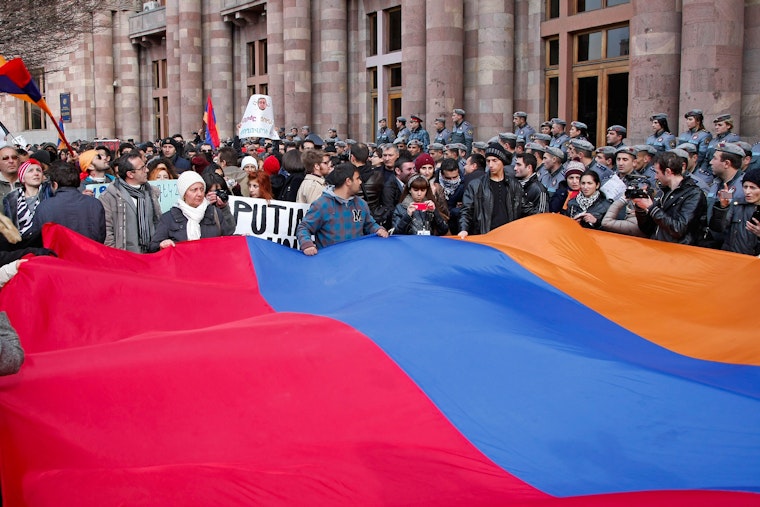Can Armenia’s Ties to the EU Be Saved?
By Larisa Minasyan

On September 3, 2013, the president of Armenia made a stunning announcement: his country would not enter into an association agreement with the European Union. Instead, he declared, it would join the Eurasian Union (at that time called the Customs Union), the economic partnership led by Russia, Armenia’s former Soviet leader.
This U-turn came as a shock to nearly all involved, because Armenia had spent the previous four years pursuing (if not always effectively) a series of reforms required for an EU association agreement, which would establish an array of economic and diplomatic ties between Armenia and the EU without actually making it a member state.
But Armenia’s sudden decision to turn towards Russia instead of Europe wasn’t savvy economics—it was a decision made out of fear of Russian retaliation. Armenia is deeply dependent on Russia because of the one million Armenian migrants who live there. Should Russia kick those migrants out, Armenia, which is not a rich country, would be starved of the crucial remittances they send back home.
Once Armenia joined Russia’s union, official rhetoric in the country changed almost immediately. It became more xenophobic and patriarchal, in line with Russia’s expansion strategy of playing to nationalistic fervor. And any pretense of the reforms looming as part of deeper integration with Europe—antidiscrimination legislation, domestic violence legislation, anticorruption measures—was abruptly halted.
Ever since then, and even before then, civil society space in Armenia has been shrinking. The possibility of an EU partnership had prevented the regime from instituting a total clampdown. But with Europe out of the picture, control over democratic institutions in Armenia tightened even further. Elections are now widely seen as fraudulent, and an independent judiciary has essentially ceased to exist. Today, the percentage of Armenians who believe in access to justice wallows in the single digits.
Meanwhile, opinion makers like Russian MPs have accused civil society organizations in Armenia of being on the Western payroll and implementing an anti-Russian agenda. One MP made the outrageous claim that the 350 civil society groups currently working in Armenia were partly to blame for the conflict in Ukraine. Another stood on the floor of the parliament and called for women’s NGOs to be burned to the ground.
A new NGO law was suggested, in fact, that was very much in the Russian mold. It would have allowed government officials to be present at any NGO meeting where internal affairs were being discussed. The law mandated that NGOs provide regular reports to the government specifying the names of their members, how many members they had, and events planned by the group. Failure to provide this information would be grounds for a shutdown.
Thankfully, we managed to stop the bill and get it redrafted. It’s still not good for civil society, but the most dangerous components are gone.
At this moment it is absolutely critical for Armenia to embrace values of a healthy democracy—not just for civil society, but for Armenia’s continued existence. If Armenia were abandoned to Russia, it would become a powerless outpost, another brick in the wall of that country’s relentless expansion ambitions. Already, Armenia’s economic fusion with Russia has harmed it. As plunging oil prices drove down the value of the ruble, remittances sent home by Armenian migrants fell by 57 percent from January 2014 to January 2015.
The Armenian president has said that as far as values and culture go, we are a European country. The alliance with the Eurasian Union is purely an economic one. For the last several months we’ve undergone a scoping exercise to figure out some sort of new agreement with the European Union. The association agreement may be off the table, but Armenia is still an eastern partner with the EU, and still receives financial assistance from Brussels. Not as much as we used to, since much of the assistance was for the reforms, but the ties are still there, and they can be strengthened.
At a summit in Riga this May, where our president will meet with top EU heads of state, we hope to gain clarity on whether Europe will negotiate toward a meaningful, binding agreement that strengthens ties between Armenia and the EU. Whether that means offering visa liberalization or greater transparency in surveillance efforts, it’s critical that Europe embrace Armenia, and that Armenia, despite its Russian link, embrace Europe right back.
Larisa Minasyan is the director of the Open Society Foundations–Armenia.